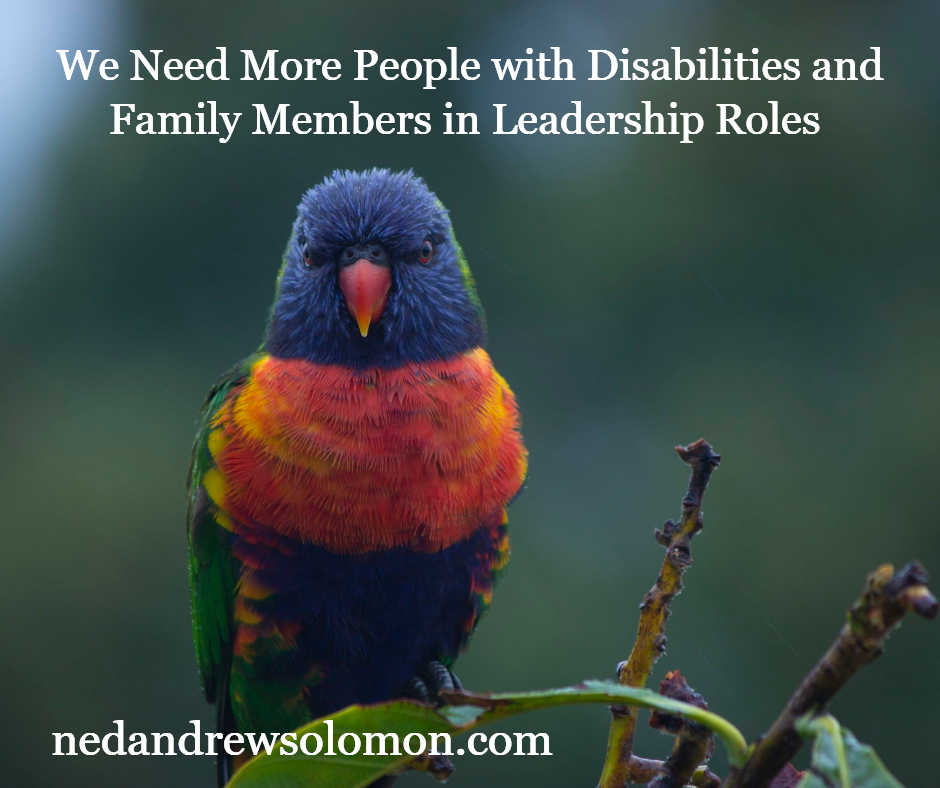This year, Tennessee’s Department of Intellectual and Developmental Disabilities (DIDD) brought on a Commissioner who is the father of a child with a disability. Good on them! That’s the kind of hire that needs to happen more.
Our disability-specific agencies that serve families that experience autism, Down syndrome, epilepsy, traumatic brain injuries, mental health issues, blindness, deafness, etc., are typically led by people who experience that disability, or family members who have a primary caregiving role for someone with that disability. As it should be. But outside these disability-specific organizations, we need more examples of directors who have first-hand knowledge of disability, who “live the life”. I’m talking about entities like the state Arc chapters, the Councils on Developmental Disabilities, the Centers for Independent Living, the University Centers for Excellence in Developmental Disabilities (UCEDDs), the Protection & Advocacy agencies, the many Partners in Policymaking® programs that exist in the United States and elsewhere in the world, and others.
Are people with disabilities and family members of people with disabilities not applying for these jobs? That’s unlikely, since we know that the employment rate for people with disabilities is abysmally low, and these folks would likely feel more comfortable in a role that relies on their daily experiences and life-hewn expertise. Which leads to a second question: are people with disabilities and family members of people with disabilities being actively sought for these positions? Are agencies demanding that family members and adults with disabilities are in the applicant pool?
Now, I’m absolutely in favor of finding the most qualified person to fill a position. But given two equally qualified and impressive candidates, I’m also absolutely in favor of giving an “extra point” to those who live the life.
I’ll be totally honest with you: as a Partners director of 19 years, I utilized a point system to accept applicants into each year’s class. Full disclosure: I even suggested that our panel of application reviewers use this point system. Is the applicant a person with a disability, vs a family member? Is the applicant a person of color? Is the applicant a male? (Note: I realize “male privilege” is everywhere! But the vast majority of Partners participants are female; overwhelmingly, primary caregivers are female. We need dads and adult brothers to step up to the plate! And taking Partners is a great first step.) Does the applicant live outside of Tennessee’s main metropolitan areas? Does the applicant live in a rural or otherwise underserved community? Is the disability of the applicant, or the family member, something we don’t typically see? Is the applicant an adult sibling of a person with a disability, as opposed to a mother or father? All of these categories might garner an extra point, when looking at a pool of 60-90 two-page applications.
I believe that, when recruiting and hiring people for positions within entities that are charged with serving people with disabilities, applicants with disabilities and applicants who are family members of people with disabilities, deserve an extra point. And there should be points for ethnic, racial and cultural diversity within this population too.
No educational degree or years of professional experience can ever take the place of living the life, 24/7, January 1 through December 31. Can a person who doesn’t have a disability, or who doesn’t have a primary familial connection to a person with a disability do a good job as a director of an agency that serves people with disabilities? Absolutely. Many of these directors do an outstanding job, and many are or grow into powerful advocates for the people they serve.
But they do not live the life.
Partners in Policymaking graduates have been trained to use their voices. To speak up and stand up for issues that are important to them and the people they love. As a Partners graduate myself, this is my personal soapbox. I want us to advocate for these agencies to seek out and strongly consider applicants with disabilities, and their family members, for leadership roles. Leaders who live the life.
For years we’ve been hearing the drumbeat of concern that our disability leaders are getting old. Many are retiring or dying. Many of them simply can’t carry the mantel anymore. Who is going to take their place? Professionals who have no personal connection to disability, or people who live the life?
There’s plenty of room for others on my very sturdy soapbox. If you agree, then make your voice heard. What’s going on in your state? Is there a succession plan in place for your state’s aging directors? Are people with disabilities or family members of people with disabilities being considered? Recruited? Interviewed?
Hired?

Speak Your Mind